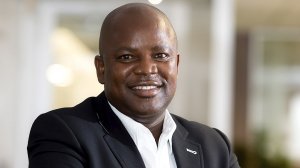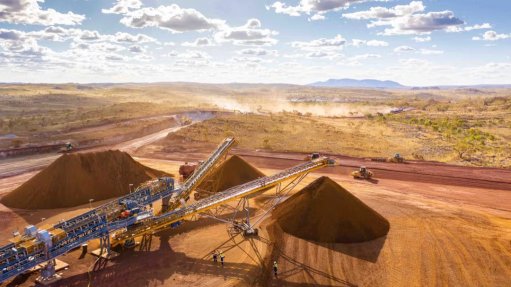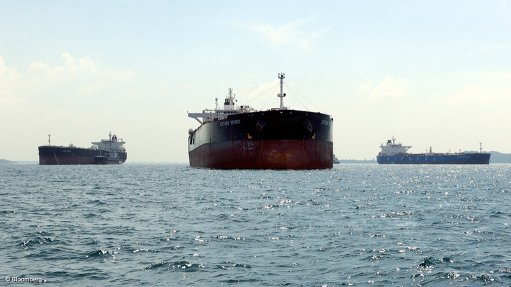Thungela’s underwhelming interim results attributed to coal price dips, rail inefficiencies

Watch Thungela CEO July Ndlovu explain what lies behind the company's interim results for the six months ended June 30
Coal producer Thungela has blamed an unfavourable price environment across the Richards Bay and Newcastle Benchmark coal prices, together with the continued underperformance by State-owned Transnet Freight Rail (TFR), for a significant year-on-year deterioration in its financial performance for the six months ended June 30.
Although the company’s revenue increased by 17% year-on-year, from about R14.3-billion to about R16.7-billion, its profits dropped by 61%, from about R3-billion for the six months ended June 30, 2023, to about R1.1-billion in the period under review.
As a result, earnings a share for the period under review amounted to R9.52, compared with R22.45 in the prior comparable period – a decline of 58%.
Headline earnings a share also dipped by 58% year-on-year, from R22.46 to R9.52.
This resulted in an 80% year-on-year decrease in dividends issued to shareholders, from R10 a year ago to R2.
Every other financial metric dropped in a similar fashion. Adjusted earnings before interest, taxes, depreciation and amortisation (Ebitda) declined by 51% year-on-year, from R4.38-billion to about R2.1-billion, with the adjusted Ebitda margin, reflected as a percentage, dropping by 18 percentage points, from 31% to 13%.
Adjusted free operating cash flow went down by 78% since last year, from just under R4.3-billion to R936-million, while net cash fell 51%, from just less than R13.6-billion to just under R6.7-billion.
The only financial metric other than revenue that saw a notable increase was capital expenditure (capex), which increased by 78% year-on-year, from R893-million in the prior comparable period to about R1.5-billion in the first half of this year.
“What I've seen with capital projects and what destroys enormous value, is when you start projects, and before you complete them, you stop them, and you restart again. It destroys value like you've never seen.
“What you want to be able to do is, once you decide to invest in a project because its economics are compelling, through the cycle, you want to complete it,” Thungela CEO July Ndlovu told Mining Weekly on August 19 in defence of the increased capex.
In June, Thungela completed the repurchase of ordinary shares for R441-million, representing 2.35% of the issued share capital.
The company also invested R742-million in sustaining capital, leading to an adjusted operating free cash flow of R936-million. Additionally, Thungela continued to invest in life extension projects, with an additional R799-million spent on expansionary capital.
In Australia, the company contributed R855-million to an investment vehicle to secure financial guarantees for Ensham rehabilitation liabilities. Thungela also made the required yearly contribution of R188-million to the green fund in South Africa to ensure environmental liability coverage.
“We've invested a little bit more in building the robustness and resilience of our business and competitiveness for the future to ensure that this business generates attractive returns. We think that's a good investment. And if you are doing that in the context of a strong balance sheet, we think that's a good capital allocation framework,” Ndlovu said.
However, despite the decline in overall performance year-on-year, Ndlovu remained optimistic that the company was doing the right things and that, owing to the cyclical nature of commodity markets, the efforts would pay off in upcoming cycles.
“What we're demonstrating really is the resilience and robustness of our business model and our ability as a management team to control those factors which are in our control, which is to operate safely, control your costs, and drive productivity. If you get those right, commodity markets, by their very nature, are cyclical, and we believe that we've set this business up to be able to deliver returns for our shareholders through the cycle,” he said.
Ndlovu noted that the previous cycle benefitted from a “once-in-a-generation” explosion in thermal coal prices, which was unsustainable. He said the current results reflected a return to a more normalised coal pricing environment.
“These prices are probably more normal, and the trick for us is to create a competitive business,” he said.
Global demand for coal reached a record high of 8.7-billion tonnes in 2023, with Ndlovu noting that this was expected to remain stable in the coming years and that, despite the decline in coal use in the US and EU, coal remained a crucial energy source for electricity, steel and cement production globally.
He said that the increasing demand from Asian economies outweighed the efforts to phase out coal globally, and energy transition was delayed as energy security became a priority amid geopolitical tensions and potential supply disruptions.
However, following a period of supply growth at the onset of the Russia-Ukraine conflict, Ndlovu said that global supply was likely to tighten as both country and company environmental, sustainability and governance pledges were introduced. He said that supply would further be impacted by limited access to capital and insurance, which would discourage new production coming online.
Ndlovu said this provided an opportunity for Thungela.
Further, milder winter conditions in the northern hemisphere led to reduced demand and higher gas and coal stock levels, which contributed to the softer benchmark coal prices experienced in the first half of the year.
He said thermal coal markets remained responsive to price movements in the energy markets, more specifically movements in the gas market. In particular, the impact of geopolitical tensions in the Middle East and the ongoing Russia-Ukraine conflict continued to heighten risks around gas supply, which had provided recent support for the Richards Bay Benchmark coal price, averaging $101.05/t for the first half of the year.
Ndlovu noted that the lack of availability of high-quality coal, and the expected restocking in southeast Asia following the monsoon season, could support the Richards Bay Benchmark coal price, which remained range-bound, while any further geopolitical escalation might result in the strengthening of coal prices.
RAIL WOES
Ndlovu said he was optimistic about TFR’s ongoing efforts to improve its performance, stating that he was satisfied that “the building blocks are in place” for this turnaround to take effect in the near future.
“What we've seen is a far quicker ramp-up than the previous two years, which again talks to suggested improvements. We think that one should make sure that we're not going backwards. The worst is probably behind us,” he said.
However, Ndlovu noted that TFR’s rail performance in the first half of the year was nonetheless disappointing at 47.3-million tonnes a year for the whole industry, in comparison to the 47.9-million tonnes a year railed in the same period in 2023.
However, he noted that the ongoing support from industry had enabled progress on some of the interventions already in place, such as the purchasing of critical locomotive spares and the provision of security on the rail line.
He said that the industry would recover these costs through the mutual cooperation agreement with TFR, which was put in place earlier in the year.
“Transnet has stopped the bleeding. It has not gone backwards. Overall, we are quite pleased with some of the work that the team is doing,” Ndlovu said.
He explained that, while Thungela believed TFR was heading in the right direction, the company only expected to see an improved rail performance from 2025.
“We should see a stabilisation and beginning to improve the performance of Transnet. We have taken a pragmatic view that we probably shouldn't see too much improvement in 2024, but in 2025, if you're adding capacity and you continue to do critical maintenance, all those should improve performance,” he said.
Article Enquiry
Email Article
Save Article
Feedback
To advertise email advertising@creamermedia.co.za or click here
Announcements
What's On
Subscribe to improve your user experience...
Option 1 (equivalent of R125 a month):
Receive a weekly copy of Creamer Media's Engineering News & Mining Weekly magazine
(print copy for those in South Africa and e-magazine for those outside of South Africa)
Receive daily email newsletters
Access to full search results
Access archive of magazine back copies
Access to Projects in Progress
Access to ONE Research Report of your choice in PDF format
Option 2 (equivalent of R375 a month):
All benefits from Option 1
PLUS
Access to Creamer Media's Research Channel Africa for ALL Research Reports, in PDF format, on various industrial and mining sectors
including Electricity; Water; Energy Transition; Hydrogen; Roads, Rail and Ports; Coal; Gold; Platinum; Battery Metals; etc.
Already a subscriber?
Forgotten your password?
Receive weekly copy of Creamer Media's Engineering News & Mining Weekly magazine (print copy for those in South Africa and e-magazine for those outside of South Africa)
➕
Recieve daily email newsletters
➕
Access to full search results
➕
Access archive of magazine back copies
➕
Access to Projects in Progress
➕
Access to ONE Research Report of your choice in PDF format
RESEARCH CHANNEL AFRICA
R4500 (equivalent of R375 a month)
SUBSCRIBEAll benefits from Option 1
➕
Access to Creamer Media's Research Channel Africa for ALL Research Reports on various industrial and mining sectors, in PDF format, including on:
Electricity
➕
Water
➕
Energy Transition
➕
Hydrogen
➕
Roads, Rail and Ports
➕
Coal
➕
Gold
➕
Platinum
➕
Battery Metals
➕
etc.
Receive all benefits from Option 1 or Option 2 delivered to numerous people at your company
➕
Multiple User names and Passwords for simultaneous log-ins
➕
Intranet integration access to all in your organisation



















